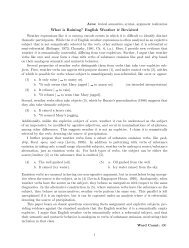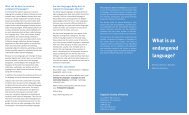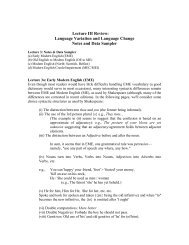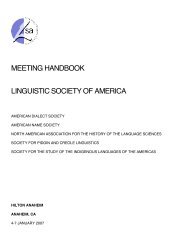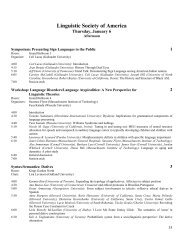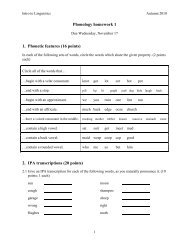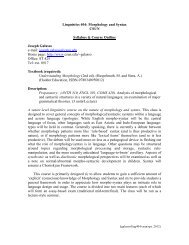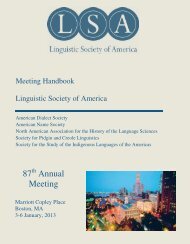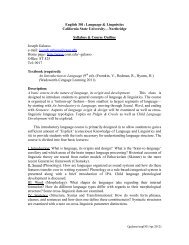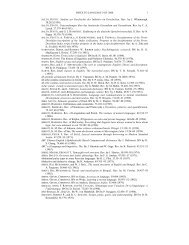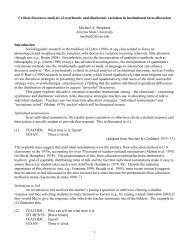here - Linguistic Society of America
here - Linguistic Society of America
here - Linguistic Society of America
Create successful ePaper yourself
Turn your PDF publications into a flip-book with our unique Google optimized e-Paper software.
Greek. This approach has some theoretical consequences. First, the person feature is encoded in the head D <strong>of</strong> pronominal DPs,but not non-pronominal ones. Second, the agreement on the verb is indirectly controlled by the pronoun via the mediating head D<strong>of</strong> pronoun-noun collocations.C.-T. Tim Chou (University <strong>of</strong> Michigan) Session 17Sujeewa Hettiarachchi (University <strong>of</strong> Michigan)On Sinhala case markingBased on (i) the interaction between case-marking and the interpretation <strong>of</strong> modals in Sinhala, and (ii) how case-marking affectsthe scopal interpretation <strong>of</strong> quantifier NPs., we argue that (i) case-marking in Sinhala is not entirely dependent upon the volitivity<strong>of</strong> the verbs, (ii) t<strong>here</strong> exist both structural case and semantically determined in<strong>here</strong>nt case in Sinhala, and (iii) A-movement inSinhala is case-driven, rather than EPP-driven (see Epstein & Seely 2006; Bosǩović 2002).Lina Choueiri (<strong>America</strong>n University <strong>of</strong> Beirut) Session 41The syntax <strong>of</strong> prepositional datives in Lebanese ArabicFocusing on send-type verbs (Rappaport-Hovav and Levin 2008), I establish some <strong>of</strong> the analysis <strong>of</strong> prepositional datives inLebanese Arabic. In this talk, I build an argument for two alternative structures for prepositional datives, which parallel thealternative structures instantiated by give-type verbs, which give rise to the well-known dative alternation. I show how data fromvariable binding, quantifier scope interaction, and clitic-doubling can be accounted for in light <strong>of</strong> the two proposed alternativestructures. I also examine the interpretive dimension <strong>of</strong> the analysis and explore its consequences for the syntax <strong>of</strong> dativeconstructions.Wing-Yee Chow (University <strong>of</strong> Maryland) Session 34Colin Phillips (University <strong>of</strong> Maryland)Suiping Wang (South China Normal University)Unfolding predictions in semantic interpretation: insights from blindness to thematic role reversalsNeurolinguistic research has established that the N400, an event-related brain potential (ERP) response, is larger for unexpectedwords than expected words. Surprisingly, the N400 is ‘blind’ to gross thematic anomalies created by reversing the arguments inverb-final sentences. In three ERP experiments using the SOV ba-construction in Mandarin Chinese, we found that this blindnesscan be remedied if comprehenders have more time between the arguments and the verb to update their expectations. Thesefindings suggest that predictions are generated based on different types <strong>of</strong> information at different time scales. Lexical semanticrelations can impact predictions more immediately than word order.Barbara Citko (University <strong>of</strong> Washington) Session 13Martina Gračanin-Yuksek (Middle East Technical University)Multiple coordinated relative clausesSyntactic and semantic properties <strong>of</strong> coordinated wh-questions in (1) (CWHs) have received a lot <strong>of</strong> attention in recent years(Citko & Gračanin -Yuksek 2012, Gračanin -Yuksek 2007, Gribanova 2009, among others). (1) What and w<strong>here</strong> did John sing?Given the well-documented parallels between questions and relative clauses, in this paper we ask whether analogous coordinationis ever possible in the domain <strong>of</strong> relativization, more specifically: (i) what types <strong>of</strong> relative clauses, if any, allow coordination <strong>of</strong>relative pronouns? (ii) do relative clauses with coordinated wh-pronouns exhibit the same amount <strong>of</strong> crosslinguistic variation asCWHs?Lauren Clemens (Harvard University) Session 3Gregory Scontras (Harvard University)Maria Polinsky (Harvard University)Resumptive pronouns in English: speaker-oriented reference trackingResumptive pronouns (RPs) are claimed to ameliorate English island violations, yet this theoretical intuition is notsubstantiated experimentally. In a departure from previous methodologies, we conducted an auditory experiment on theacceptability <strong>of</strong> RPs in English under several island conditions. Our results show that i) even in spoken language, themedium w<strong>here</strong> they most naturally occur, RPs do not improve the perceived acceptability <strong>of</strong> English island violations,and ii) English RPs do not facilitate the parsing <strong>of</strong> island violations. We propose that English RPs are primarily acoreference-tracking device used by the speaker.142



